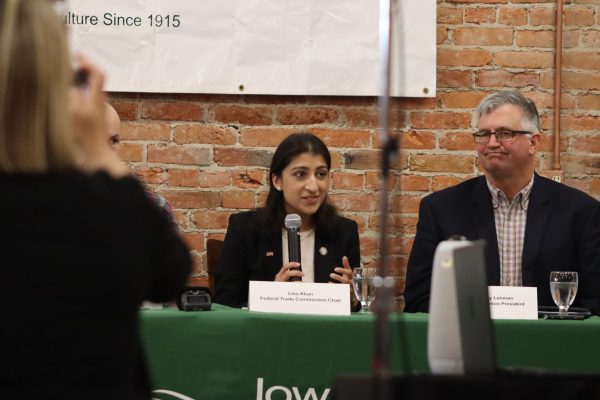ISU research team investigates soil erosion solutions
January 31, 2014
Iowa State has created a soil erosion project to better control ephemeral, or temporary, erosions to aid farmers. The gully forms when rain run-off creates channels through farmers’ fields.
Farmers are able to fill in the ephemeral gullies when they till the ground. There are many other kinds of gullies, but the soil erosion project concentrates on gullies that can be prevented.
The U.S. Department of Agriculture’s National Integrated Water Quality Program has four main areas of study: research, outreach, extension and education.
“The research drives the project,” Richard Cruse, professor of agronomy and leader of the soil erosion project, said.
The four areas of study are very important because the information the researchers find is taught to farmers and the local communities through outreach. Thomas Paulsen, assistant professor of agricultural education and studies, is the principal investigator for the project. Paulsen is working on a module that will be beneficial for high school teachers to use.
There are about nine researchers who are involved with the program. They are all of different ages and experience levels. A few graduate students are working on the project to help with the research as well.
All of the samples and measurements, along with the needed resources of the soil, are done in Iowa. The program uses water sheds that help with collecting data, allowing the comparison of data from similar soil samples to draw conclusions. The soil that erodes from multiple fields will then flow into the water sheds, making the collection of data more efficient.
The researchers measure the volume of soil that is lost from the gullies, and they have models that give an estimation of the loss. They also use a tool that measures the soil coming from each water shed.
The amount of soil erosion is about the same as the past, yet today it is more harmful to the land. Farmers use a continuous row crop, which aggravates the land.
The climate is also a factor. The change in temperature and precipitation aggravates the land.
Chemicals have a big impact on soil erosion. Roundup Ready crops, or crops that are genetically modified to be resistant to the herbicide Roundup, allow the spraying of herbicides on the crop. The crops are resistant to the herbicide, which means that only the weeds are killed.
“We are eroding soil faster than estimated measures tell us,” Cruse said.
The grass is not resistant to the herbicide; therefore, the waterways are being killed if the farmer is not careful in his handling of the herbicide. The waterways are placed to help with soil erosion and water contamination, and if the grass gets killed, there is nothing to stop the erosion and damage to the fields.
















